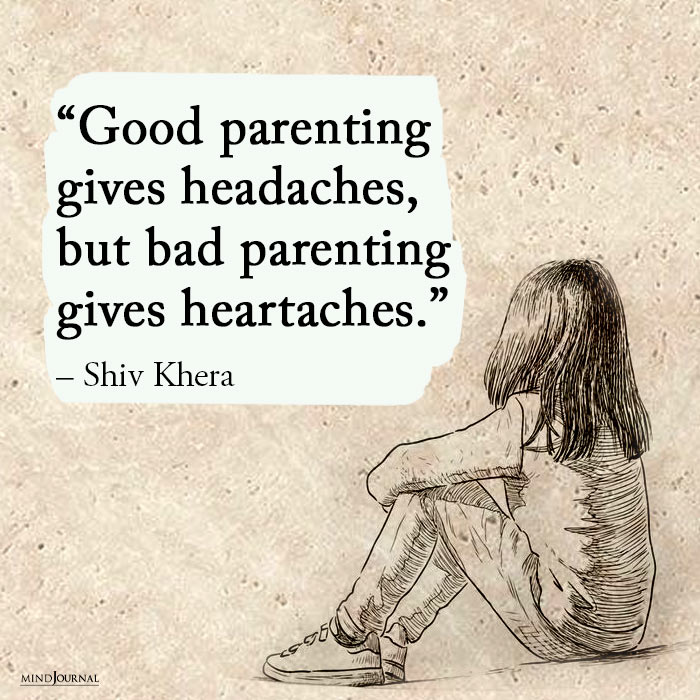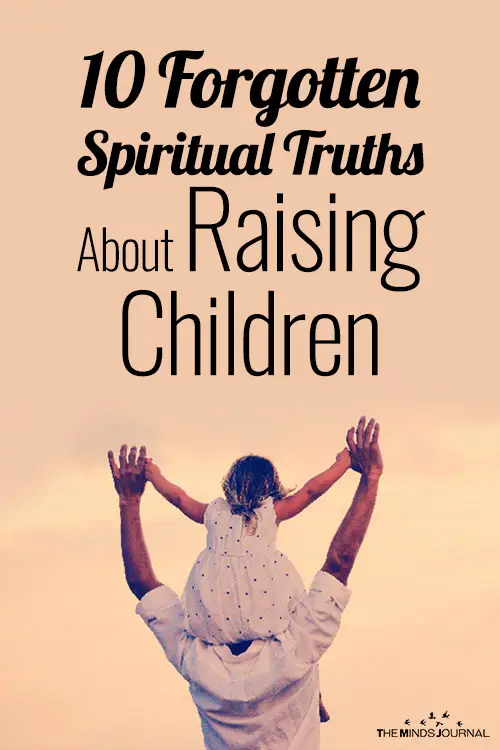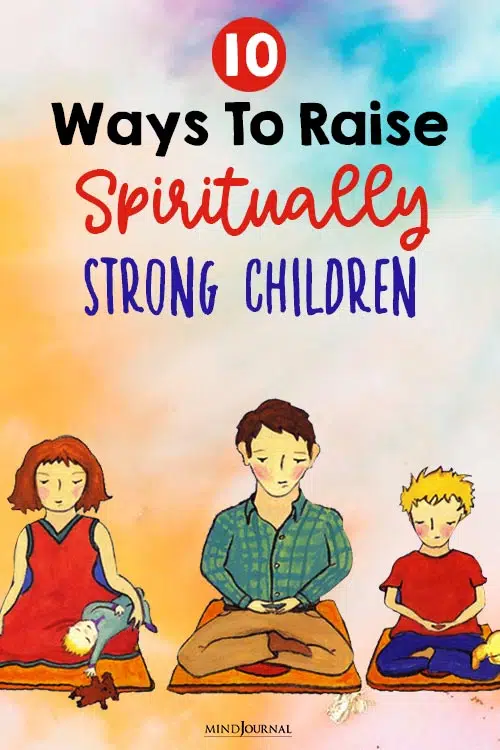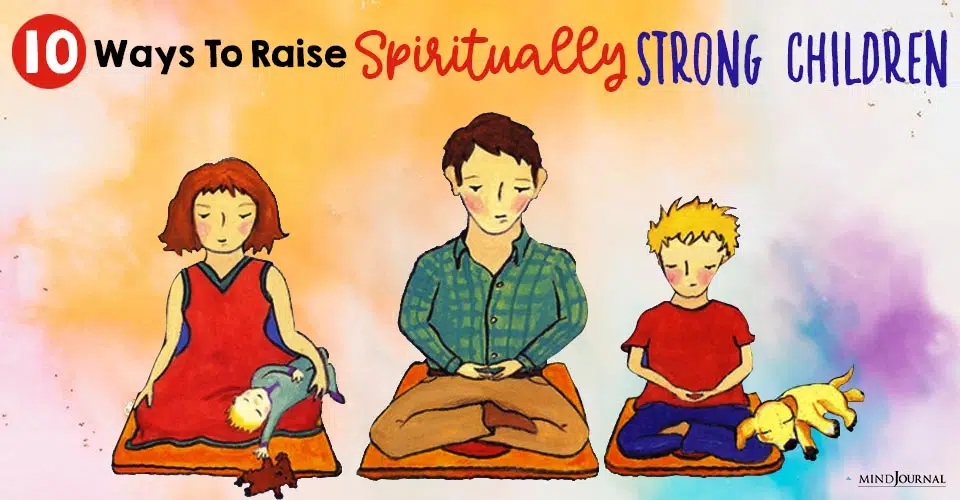Wondering how to encourage the individuality of your children? Commence your journey with spiritual parenting: a simple yet revolutionary concept that will stimulate personality development in children.
In our life, most of us have experienced one or two mysterious encounters when visitors come to us from the unknown. These special guests are in fact our own children. We love them, and we are happy that they are here, but most of us do not accept them the way we should.

They do not receive from us the deep respect and awe that wanderers who come from the depths of the Universe duly deserve. Instead, we look upon our children as if they were our own property, and we try to condition them to become adults we will be able to be proud of. Are we really good hosts for these visitors, is this really the way we should receive our guests?
Related: 8 Mistakes You MUST Avoid When Raising A Son
Spiritual Parenting: The Nature of the Conditioned Patterns of Mind
In order to find the correct answer to the question above, we first need to know ourselves as well as possible. Since if we ourselves are ignorant of what or who we are, and what the purpose of our existence in this world is, we will only be able to use the conditioned patterns of mind inherited from our parents and teachers.
A characteristic feature of these conditioned mind patterns–no matter how different they might be in different cultures–is that they reproduce themselves. They, therefore, produce human replicas that meet the expectations and norms of the society they are born into.
They adjust to and keep the rules of their respective societies, and they become effective members of that society. They think, behave and feel as expected from good citizens. In the meanwhile, they preserve the illusion of free choice, since the conditioned mind patterns are, to a certain extent, flexible.
Related: How to Raise Emotionally Intelligent Children: 3 Crucial Lessons To Teach
Then we identify with the conditioned mind patterns and begin to believe that we know the answer to the question regarding our identity, our goals in life and on the proper behavior with our visitors. In accordance with the functions of our conditioned mind patterns, we make replica human beings out of our visitors, depriving them of the possibility of developing in a way that is best for their personalities.
We do all that in good faith since we would like to save them from suffering, we intend to ensure that they are going to have a better life in a better world. As replicas, they are going to get our own suffering and our own ignorance of reality. That is how, in turn, they will receive their own visitors and convert them into human replicas.
Personality Development in Children
If we are hospitable and attentive hosts of our visitors coming to us from the unknown, we must first recognize that they, just like we ourselves before them, come to this world as wanderers.

The objective of their journey is to enable the Universe to manifest itself and to awaken into its own existence, filtering through their personalities as human beings. We must assist them in the process as more experienced wanderers who are a little bit ahead of them in the journey.
Related: 12 Signs Your Child Is An Empath? Also Tips for Raising Empathic Children
When the guests arrive at our house, they are entirely inexperienced, they do not know anything about the work of this world, and they are unable to express themselves. In other words, they do not have the means–a personality–that would help them in those processes.
They do have, however, a very effective strategy, that is, imitation, with the help of which they are able to build up a personality in a few years. For the imitation, they will choose us as a model, the people living in their environment. If we live according to our conditioned mind patterns, they will imitate those patterns. The patterns will be deeply imprinted and will serve as the foundation for their personalities.
Once our visitors have learned to speak and begin to understand more and more of the world around them, we will further improve that basic conditioning in them by explaining to them how the world functions and what they need to watch in connection with it.
We received those explanations readily from our parents and teachers, and we have no specific direct experience about these. Our messages further deepen the conditioning of our guests, who will, in turn, identify with the conditioned mind patterns.
That is how the personality of our visitors develop, though the original goal of that personality was to represent their individuality in the world. This individuality is, however, hidden deeply under the thick layers of conditioned mind patterns, beliefs, ideas, and identification. Thus it is no wonder that they live as replicas, and completely forget about their original mission in this world.
Blossoming Individuality In Child Development
All this means that we are only able to become good hosts for our visitors if we ourselves are not replicas but individuals. We must, therefore, walk the line we want our guests to walk, too.
Related: Conscious Parenting: The Art Of Raising Happy Children
Ten ideas to help our visitors to avoid becoming replicas and to allow their individuality to bloom:
1. Do not consider them as our property; instead, look upon them as beloved guests, who only need our assistance and not our control;
2. Give them a sufficient amount of freedom so that they can earn experience from the world themselves;
3. Allow them to experience more and more things by and for themselves;
4. Do not teach them things we do not have direct personal experience and we received readily from our teachers;
5. Teach them not to take anything for granted just because it was proclaimed by a person regarded as an authority by the society around them;
6. Allow them to be doubtful of anything and everything until they gather personal experience about it;
7. Help them to remain free so that they will be open to any new experience available to them;
8. Share with them our own experience;
9. Create for them an environment in which they have a lot of opportunities to laugh and live a joyful, cheerful life and enjoy life as much as possible;
10. Offer them our own example, and show them how is it possible to live a conscious and alert life.
About the author, Frank M. Wanderer Ph.D. is a professor of psychology, a consciousness researcher and writer. Frank is the author of the book The Revolution of Consciousness: Deconditioning the Programmed Mind.
If you want to learn more about spiritual parenting, here’s a video to help you out:
We hope that you’ve learnt all about the tips to encourage individuality in children. With these facts about parenting, you can be the parent your child needs!










Leave a Reply
You must be logged in to post a comment.